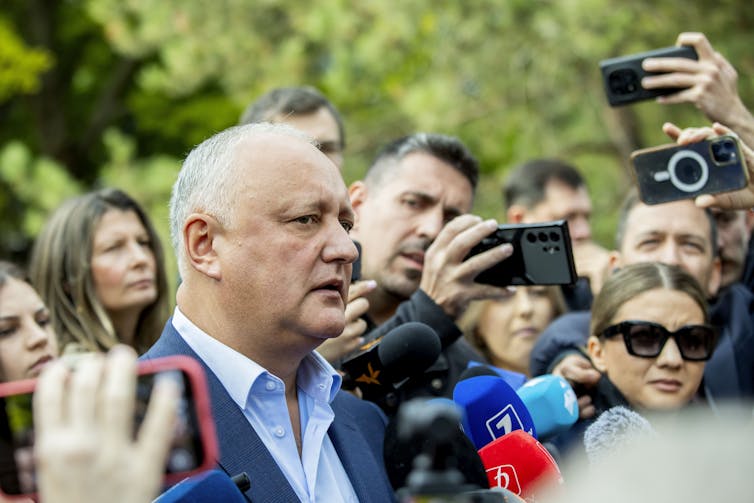Opinion
Moldova: pro-EU party wins majority in election dominated by Russian interference
Read more on post.
Moldova’s ruling pro-European Party of Action and Solidarity (PAS) won slightly more than 50% of the vote in parliamentary elections on September 28, achieving a slim overall majority. It garnered more than twice the number of votes of the main pro-Russian opposition party, Patriotic Bloc, which received just under 25% of the vote.
This result was by no means a foregone conclusion for Moldova. President Maia Sandu of PAS had warned repeatedly about the high stakes in an election that witnessed unprecedented interference by Russia. This included recruiting orthodox priests to sway voters towards supporting pro-Russian political parties.
The president of the European Commission, Ursula von der Leyen, welcomed the result. She wrote on X: “You made your choice clear: Europe. Democracy. Freedom.”
Ukraine’s president, Volodymyr Zelensky, echoed this sentiment. In a social media post, he said the “elections showed that Russia’s destabilising activity loses, while Moldova in Europe wins”.
Sandu’s party, as expected, did well in the diaspora vote. Almost 80% of these votes were cast in its favour. But it also beat the Patriotic Bloc convincingly in the vote in Moldova, with 44% compared with 28%. The party’s vote in absolute numbers also held steady in the Russian-controlled breakaway region of Transnistria, despite low voter turnout there.
Turnout in the elections was low in general, not just in Transnistria. Just over 52% of eligible voters went to the polling stations. This is slightly higher than in the three previous parliamentary elections in October 2019, March 2020 and July 2021. But it is below the turnout in the second round of the 2024 presidential election that gave Sandu a second term in office.
In one way or another, all of these elections were critical. And the fact that only around half of Moldova’s electorate cast a vote indicates a degree of resignation and frustration with the state of politics in the country.
The results of the September 28 elections, like those in the 2024 referendum on whether the country should pursue EU membership and in the 2024 presidential elections, also reflect the longstanding and – by most accounts – deepening polarisation in Moldova between the pro-European and pro-Russian camps.
The largest vote share went to parties that are either clearly pro-European or pro-Russian, with PAS and Patriotic Bloc gathering almost 75% of the total vote between them. This left little space for parties that, at least according to their election platforms, tried to attract voters favouring a balance between these two ends of the political spectrum in Moldova.

Dumitru Doru
The fact that Sandu’s party achieved an overall – and only slightly reduced – majority indicates that its support base has held up well amid Russian election interference. Its support has also seemingly remained despite the serious economic problems Moldova has faced for many years, but especially since the start of Russia’s full-scale invasion of Ukraine in February 2022.
PAS finds itself in a slightly weaker position compared to after the 2021 parliamentary elections. However, achieving more than 50% of the vote – and probably gaining 55 seats in the 101-seat parliament – is a remarkable achievement for Sandu’s party in these circumstances.
It demonstrates the growth of support for the country’s European path among the voting population. A decade ago, in November 2014, pro-European parties gained a mere 44% of the total votes cast in Moldova’s parliamentary elections. And while they still had the edge over pro-Russian parties then, they were mired in scandals and far from united.
The outcome of the September 28 vote, as well as of the 2024 presidential elections, also demonstrates the limits of Russia’s influence campaigns. Russian plots to destabilise Moldova have a long history and were in evidence in the run-up to the elections.
Moscow reportedly trained dozens of Moldovans in destabilisation tactics in Serbia, while also spending millions of euros on vote buying and disinformation. Despite these efforts, Russia has not been able to turn Moldova into a country in which a majority of the population want to halt the turn towards Europe.
This is not to deny that many Moldovans rightly fear the consequences of Russia’s war against Ukraine and the dangers of it spilling over into Moldova via the Transnistrian region, where Russia still has a small contingent of troops and retains significant political influence. But rather than seeking to appease the aggressor, many Moldovans have indicated at the ballot box that they are willing to stand up to the Kremlin.
Strong EU support
The fact that Moldova weathered these storms is also due to the strong support the country has received from the EU. The leaders of France, Germany and Poland travelled to the Moldovan capital, Chișinău, at the end of August to demonstrate their support for Sandu. And the European Commission mobilised cybersecurity experts to assist Moldova in fighting Russia’s election interference campaign.
Beyond the specifics of election support, the EU has also made significant financial support available to Moldova – €1.2 billion (£1.1 billion) between 2021 and 2025 and €1.9 billion under its reform and growth facility between 2025 and 2027. This has helped both Moldova and Transnistria avert the worst of successive energy crises.
This support by the EU in the here and now, rather than the distant promise of a brighter future inside the bloc, has been a key factor in paving the way to Sandu’s victory in the parliamentary elections. Where Russia offers endless cycles of death and destruction in neighbouring Ukraine and threatens the integrity of Moldova’s democracy and economy, the EU has been willing to support the country and its people on their path to the European future that they have clearly chosen for themselves.
That pro-European forces in Moldovan society have prevailed in the face of an intense Russian interference campaign is an important signal well beyond Moldova. It will be noted with significant relief not only in Chișinău, but also in Kyiv, Brussels and other European capitals.









